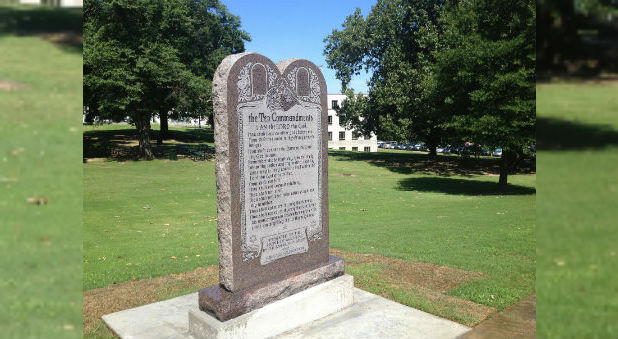Ramming the Ten Commandments: A Prophetic Picture of America
It was the act of only one man who drove his vehicle into a Ten Commandments monument in Arkansas, but it reflected the sentiments of a growing number of Americans: “We do not want the Ten Commandments in our midst, nor do we want the God of the Ten Commandments in our midst.” In that sense, the destructive act of this individual reflected the attitude of tens of millions of Americans. This is not simply a decreased interest in the Bible and the God of the Bible. This is outright rebellion.
Enough with God’s laws and standards. Enough with His moral principles. Enough with His prohibitions of idolatry and adultery and murder.
We will do what we want to do, when we want to do it, and no law—or God—will tell us otherwise.
The America we want must have no connection to its Judeo-Christian roots, no connection to the moral values of many of its founders, no connection to the Scriptures which so influenced their thinking.
We will worship created things more than the Creator, and we will be full of covetousness and greed. We want our idolatry.
We will kill our babies in the womb if we so choose, and anyone who defies our wishes will be trampled underfoot with derision and scorn. We want our murder.
Yes, we will do what we want to do when we want to do it. We declare ourselves free.
Ironically, the man in question, Michael Tate Reed, who livestreamed on Facebook as he drove his vehicle onto the Arkansas statehouse lawn, allegedly yelled “Freedom!” as he crashed into the Ten Commandments monument less than 24 hours after it was erected. He was previously charged with a similar attack on a Ten Commandments monument in Oklahoma in 2014.
The reality is, the more we depart from God’s laws, the more we find ourselves in bondage, far less free than we were before. Rather than shouting “Freedom!”, Reed should have shouted, “Bondage! Self-destruction! Captivity! Decline!”
Reed claimed that such monuments are a violation of the separation of church and state, a phrase not found in the Constitution, something that seems to have escaped Justice Sotamayor this week, and, more importantly, a phrase that meant the opposite of what Reed envisions.
In truth, the so-called wall of separation was there to keep the state out of the church, not the church out of the state. And the idea that having a public Ten Commandments display would be a violation of American principles would be totally foreign to our founders.
While doing research for my new book, Saving a Sick America: A Prescription for Moral and Cultural Reformation, due out in September, I was struck by how big a role the Bible played in early American education, from the colonies to the late 1800s. I was also struck by how deeply biblical principles influenced our founders, even though they did not want America to be a theocracy.
In other words, they were not trying to impose the biblical faith on the nation, which certainly included a significant minority of irreligious people, even back then, nor were they trying to impose biblical morality on the populace by judicial decree. Instead, many of the founders were convinced that the Bible was filled with practical wisdom and that God’s commands brought life, not death. The greater extent we embrace these principles as a democratic republic, the better.
Consider this extraordinary quote from our second president, John Adams:
Suppose a nation in some distant region should take the Bible for their only law book, and every member should regulate his conduct by the precepts there exhibited. Every member would be obliged in conscience to temperance and frugality and industry, to justice and kindness and charity towards his fellow men, and to piety and love, and reverence towards Almighty God. In this commonwealth, no man would impair his health by gluttony, drunkenness or lust—no man would sacrifice his most precious time to cards, or any other trifling and mean amusement—no man would steal or rile or any way defraud his neighbor, but would live in peace and good will with all men—no man would blaspheme his maker or profane his worship, but a rational and manly, a sincere and unaffected piety and devotion would reign in all hearts. What a utopia, what a paradise would this region be.
This quote, along with those that follow, is found in Saving a Sick America, with attribution.
Today we are told that the Bible is an evil book and the God of the Bible an evil, bigoted, petty tyrant. Such tyrants deserve our scorn. That is that attitude aflame in many American hearts today.
In sharp contrast, Samuel Adams, one of the leaders of the American Revolution, stated that the rights of the colonists “may be best understood by reading and carefully studying the institutes of the great Law-giver and head of the Christian Church [Jesus], which are to be found clearly written and promulgated in the New Testament.”
Because of that, Adams could say, “A general dissolution of principles and manners will more surely overthrow the liberties of America than the whole force of the common enemy. While the people are virtuous, they cannot be subdued; but when once they lose their virtue, they will be ready to surrender their liberties to the first external or internal invader.”
Michael Reed not only represents that “general dissolution of principles and manners.” He articulates it in a full assault, thereby speaking for millions of Americans.
We do best to quickly re-erect that Ten Commandments monument and, more importantly, recapture the life-giving beauty of God’s commandments in our own hearts and lives. That is the only hope of our nation. {eoa}
















































